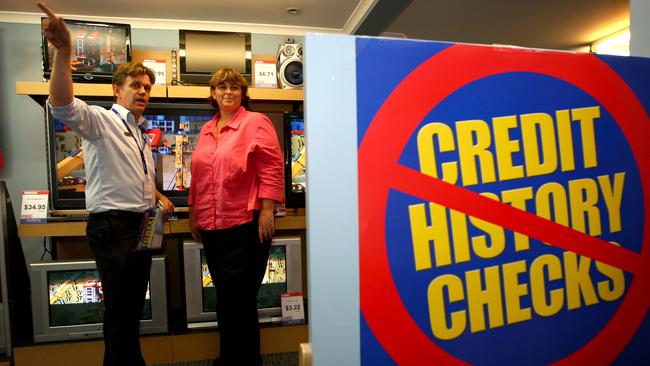Radio Rentals faces class-action lawsuit over ‘Rent, Try $1 Buy’ scheme
MOTHER-OF-FIVE slams Radio Rentals, says she feels “unfairly taken advantage of”, after thousands deducted from her account for items valued at $430.

Retail
Don't miss out on the headlines from Retail. Followed categories will be added to My News.
CUSTOMERS who signed up to Radio Rentals’ “Rent, Try $1 Buy” scheme paid up to seven times the true retail cost of the home appliances they rented, a lawsuit alleges.
Maurice Blackburn launched the class-action lawsuit in the Federal Court in Sydney on Wednesday accusing the Thorn Group-owned rental giant of “unfair and unconscionable practices”.
It alleges Radio Rentals “imposes on its disadvantaged customers onerous and unfair terms that avoid credit laws that prohibit overcharging”.
The open class action has been filed on behalf of “all who have been subjected to unfair terms”, with up to 200,000 customers potentially affected to the tune of $50 million.
“The class action alleges that one of the more insidious aspects of the business is that Radio Rentals continued to draw money on an ongoing basis from its clients’ Centrepay [Centrelink payment] accounts, well beyond the retail value of the goods,” Maurice Blackburn principal Ben Slade said in a statement.
The lawsuit is targeting Radio Rentals stores located in states other than South Australia owned by the Thorn Group. The South Australian brand Radio Rentals is not associated.
“Here we have a national company that deals with vulnerable people promising them one thing but signing them up to another, at a much higher price than is reasonable,” siad Mr Slade.
“Rent, Try $1 Buy is misleading when you delve into what’s involved. What we have found is that people are paying up to seven times the true retail costs for goods in the belief that the goods will always be theirs, yet the contracts do not give them that right.”
Wagga Wagga mother-of-five Casey Simpson is the lead plaintiff. She claims the company deducted more than $3300 from her Centrelink account for a used mattress and bed, valued at $430.
“I have four kids and am on a low income — I thought Rent, Try $1 Buy would be a sensible alternative to get some basic goods in a way we could afford. I never knew I’d have to pay as much as they kept charging me, or that I wouldn’t have a right to buy the goods for $1,” Ms Simpson said in a statement.
“I feel unfairly treated and taken advantage of. If it’s happened to me it’s likely to have happened to many others. That is why I have decided to stand up and take this action to hold Radio Rentals to account.”
Karen Cox from the Financial Rights Legal Centre added that practices needed to be called out. “A healthy business model is one that delivers real benefits to people needing a service — not one that uses misleading means to get people into situations that only make their personal plights more dire,” she said in a statement.
Legal Aid NSW lawyer Dana Beiglari said the issue was “much bigger than just one company”. “We regularly see clients who are forking over an enormous proportion of their limited incomes to pay for really basic appliances like washing machines,” she said.
“For many people who are on fixed incomes or living paycheck to paycheck, walking into a store and buying a fridge outright is not an option — so they get sucked into a lease, or multiple leases. In fact, many people do not even realise that they are renting the appliance, they think they are paying the appliance off in instalments.”
In 2012, the Consumer Action Law Centre requested the corporate watchdog investigate Radio Rentals over the “Rent, Try $1 Buy” scheme.
“We believe many Australians would hear Radio Rentals’ ‘Rent, Try $1 Buy’ adverts and reasonably think that customers can buy the goods for $1 at the end of a lease contract — but the reality is the fine print says they have the option of buying a similar product,” Consumer Action chief executive Gerard Brody said at the time.
“We think, in this situation, the headline and the fine print tell two different stories. We all know the devil is often in the detail, but it is not unreasonable for consumers to expect the fine print to reflect what’s in the headline.
“If the contract was a credit contract — that is, a contract where there is a right or obligation to purchase the goods, then Radio Rentals would have to disclose costs of credit before the contract is entered into.
“With consumer leases, contractual disclosure requirements are different. It looks to us like Radio Rentals want to have it both ways — on the one hand they are subject to the different disclosure requirements that apply to consumer leases at law but on the other hand their advertising arguably creates the impression that consumers are getting more than a lease.”
Thorn Group has been contacted for comment.
In its “Responsible Rental Policy”, the company says that “when we say we’ll give you a fair go, we mean it”. “Applications are assessed on your current situation and capacity to pay,” it says. “We will never over commit you — it’s not in your interest, or ours.”

Originally published as Radio Rentals faces class-action lawsuit over ‘Rent, Try $1 Buy’ scheme






